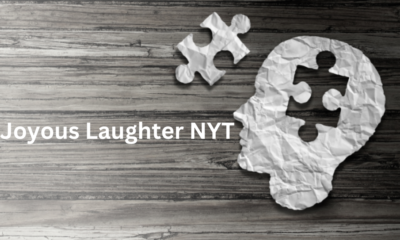News
Maximizing Career Opportunities: The Importance of Liberal Arts Education
Published
10 months agoon
By
Micheal
Table of Contents
- Why Liberal Arts Education Matters
- Diverse Skill Sets Offered
- Adapting to Various Career Opportunities
- The Role of Networking and Real-Life Experiences
- Research Findings on Liberal Arts Graduates
- Final Thoughts
Why Liberal Arts Education Matters
Education in the liberal arts is more important than ever. It encourages students to explore various subjects, fostering a well-rounded knowledge base. This kind of education prepares you for specific careers and equips you with essential life skills. The journey through a liberal arts degree introduces students to critical thinking, creativity, and adaptability, which are invaluable in today’s fast-paced world.
At its core, a liberal arts degree emphasizes interdisciplinary learning and cultural awareness. Students often gain insights from fields as varied as literature, history, science, and philosophy. This breadth of knowledge is vital for developing a holistic understanding of the world. Furthermore, engaging with multiple perspectives enhances empathy and ethical reasoning, making graduates well-rounded. These kinds of analytical and soft skills allow them to navigate the complexities of modern society with greater ease and effectiveness.
Diverse Skill Sets Offered
One of the main advantages of a liberal arts education is the diverse skill sets it offers. You learn to think critically, communicate effectively, and solve complex problems, which are highly sought after in today’s dynamic job market. According to a report published in Inside Higher Ed, employers like the comprehensive skill sets that liberal arts degrees offer because they include critical thinking, creativity, and teamwork.
In particular, the ability to write compellingly and argue persuasively can be a game-changer in any professional setting. Whether crafting a business proposal or interpreting data, these skills are indispensable. Additionally, the collaborative nature of many liberal arts programs strengthens teamwork abilities, preparing students to thrive in diverse work environments. Classes often involve group projects and presentations, which simulate real-world challenges and enhance public speaking and leadership skills. The emphasis on effective communication also ensures that liberal arts graduates can convey complex ideas clearly and persuasively, an asset in any career.
Adapting to Various Career Opportunities
Liberal arts graduates are renowned for their flexibility. Whether shifting industries or taking on new roles, the flexibility ingrained through a liberal arts education proves invaluable. An article from The New York Times highlights how liberal arts students excel in various career paths, from tech to business to public service. This adaptability stems from a curriculum that emphasizes transferable skills and lifelong learning.
This adaptability is rooted in the curriculum, often including exposure to multiple disciplines. This exposure nurtures a passion for lifelong learning and opens doors to various career paths, providing a safety net in fluctuating job markets. Moreover, liberal arts graduates are well-prepared to tackle complex and ambiguous problems, making them valuable assets in any organization. Constant engagement with diverse subject matters equips them with the flexibility to pivot between roles, industries, and career stages. Their unique ability to synthesize information from varied sources enables them to innovate and create new solutions in their professions.
The Role of Networking and Real-Life Experiences
Networking and real-life experiences are central to a liberal arts curriculum. Internships, workshops, and group projects offer students invaluable professional connections and practical insights. These experiences provide a smooth transition from academic to professional life. Building a professional network during college can open doors to job opportunities and mentorship, which are crucial for career advancement.
For instance, internships often lead to job offers, as employers highly value candidates who have hands-on experience. Additionally, workshops and group projects simulate real-world challenges, better-preparing students for what lies ahead. Through these experiences, students may put their academic knowledge to use in real-world situations, which improves their ability to solve problems and make decisions. Interacting with professionals from various fields during education will enable students to receive mentorship and guidance that can profoundly shape their career paths. Furthermore, extracurricular activities, such as debates and student organizations, further build essential skills and networks that serve students well beyond their college years.
Research Findings on Liberal Arts Graduates
Research consistently shows that liberal arts graduates excel in various fields. A study by the American Academy of Arts & Sciences found that these graduates often hold leadership positions and report high levels of job satisfaction. These results highlight the practical benefits of a liberal arts degree, as it provides individuals with the hard and soft skills necessary for success in the workplace.
Surveys also indicate that these graduates possess solid ethical foundations and a commitment to civic engagement. These qualities make them not just employees but leaders who positively influence their communities and industries. Thinking critically and approaching problems from multiple perspectives enables liberal arts graduates to innovate and drive change in their respective fields. Additionally, many liberal arts graduates pursue advanced degrees, further enhancing their expertise and expanding their career opportunities. Their strong ethical foundations inspire them to lead with integrity, promote positive social change, and contribute to the larger good. These intrinsic qualities make them successful professionals and influential community members who can advocate for and implement meaningful change.
Final Thoughts
Liberal arts education offers more than just academic knowledge; it provides diverse skills, adaptability, and a strong network. These elements form a solid foundation for a fulfilling career. Whether you’re undecided about your future or looking to expand your career horizons, a liberal arts education is a worthwhile investment. The combination of critical thinking, communication, and problem-solving skills developed through a liberal arts education prepares graduates for various professional and personal challenges.
In conclusion, the multi-faceted approach of a liberal arts education nurtures professional success, personal growth, and ethical responsibility. It empowers students to become adaptable, empathetic, and insightful individuals who can navigate a rapidly changing world with confidence and foresight. A liberal arts degree is beneficial because it may lead to various opportunities and instill in its graduates a lifelong love of learning and a commitment to making a significant contribution to society. Thus, investing in a liberal arts education invests in a more versatile, resilient, and enriched future.
News
Uncuymaza: Exploring the Ancient Tradition of the Andean Culture
Published
2 months agoon
March 18, 2025By
Micheal
Uncuymaza is a term deeply rooted in the ancient traditions of the Andean culture. It is more than just a word; it represents a profound cultural practice that has been passed down through generations. This practice, which finds its origins in the heart of the Andean mountains, continues to be an integral part of the lives of those who inhabit this region.
The Origins of Uncuymaza
Uncuymaza has its roots in the early civilizations of the Andes, particularly among the Inca and pre-Inca societies. These ancient cultures placed a significant emphasis on their connection with nature, and Uncuymaza is a reflection of this bond. The term itself is derived from the Quechua language, which was spoken by the Inca and remains widely spoken in the Andean regions today. In Quechua, Uncuy maza refers to a ritual or practice that is closely tied to the land, the seasons, and the agricultural cycle.
Uncuymaza as a Cultural Practice
Uncuymaza is not a single event or ritual; rather, it encompasses a variety of practices that are performed throughout the year. These practices are primarily agricultural and revolve around the planting, cultivating, and harvesting of crops. The Andean people have a deep respect for the earth, which they view as a living entity. Uncuymaza is a way of honoring the earth and ensuring that it continues to provide for the people.
One of the most important aspects of Uncuymaza is the offering of thanks to the earth, or Pachamama, as she is known in Quechua. This offering, known as a “despacho,” is a carefully prepared bundle of natural items, including grains, seeds, coca leaves, and other offerings. The despacho is a symbolic gesture, representing the balance and harmony between humans and nature. It is often buried in the earth as a way of returning what has been taken, ensuring the continued fertility of the land.
The Role of the Seasons in Uncuymaza
The Andean calendar is closely tied to the agricultural cycle, and Uncuy maza practices are timed to coincide with the changing seasons. Each season brings with it specific tasks and rituals that are necessary for the successful cultivation of crops. For example, during the rainy season, which is known as the “wet season,” there are rituals performed to ask for rain and to ensure that the crops receive enough water. Conversely, during the dry season, rituals are performed to protect the crops from drought and to pray for a bountiful harvest.
These seasonal rituals are not just about ensuring a good crop; they are also about maintaining the spiritual balance of the community. The Andean people believe that by performing these rituals, they are maintaining a connection with the natural world and with their ancestors, who continue to watch over them.
Uncuymaza in Modern Times
While the practice of Uncuymaza has its roots in ancient traditions, it is still very much alive today. In many Andean communities, particularly in rural areas, these practices continue to be an integral part of daily life. However, like many traditional practices, Uncuymaza has also had to adapt to the modern world.
In recent years, there has been a resurgence of interest in traditional Andean practices, including Uncuymaza. This renewed interest is partly due to a growing awareness of the importance of preserving cultural heritage. Many younger people in the Andean region are now learning about these traditions from their elders and are actively participating in the rituals.
There has also been a growing interest in Uncuy maza from outside the Andean region. People from around the world are drawn to the spiritual aspects of the practice and are interested in learning more about the Andean way of life. As a result, some communities have begun to offer workshops and ceremonies for visitors, allowing them to experience Uncuymaza firsthand.
The Significance of Uncuymaza Today
Uncuymaza is more than just a cultural practice; it is a way of life that embodies the values of the Andean people. It is about living in harmony with nature, respecting the earth, and honoring the wisdom of the ancestors. In a world that is increasingly disconnected from the natural world, Uncuymaza serves as a reminder of the importance of maintaining a close relationship with the land.
For the Andean people, Uncuymaza is a source of identity and pride. It is a link to their past, a connection to their ancestors, and a way of preserving their culture for future generations. In this sense, Uncuymaza is not just a tradition; it is a living practice that continues to evolve and adapt to the changing times.
The Future of Uncuymaza
As the world continues to change, so too will the practice of Uncuy maza. However, its core principles of respect for the earth and living in harmony with nature will remain unchanged. These principles are timeless and universal, resonating with people far beyond the Andean region.
The future of Uncuymaza will likely involve a blend of traditional practices and modern innovations. As more people become aware of the importance of sustainability and environmental stewardship, there may be a greater appreciation for the wisdom of the Andean people and their way of life.
In the years to come, Uncuymaza may become more widely known and practiced, not just in the Andes but around the world. As people seek to reconnect with nature and find meaning in their lives, the ancient traditions of the Andean people, embodied in the practice of Uncuymaza, will continue to offer guidance and inspiration.
Conclusion
Uncuymaza is a profound expression of the Andean people’s deep connection with nature and their cultural heritage. Rooted in ancient traditions, it continues to thrive in modern times, preserving the wisdom of the past while adapting to the present. As a practice that honors the earth and seeks harmony with the natural world, Uncuy maza offers valuable lessons for a world increasingly in need of sustainable living. Whether through seasonal rituals, offerings to Pachamama, or the continued teaching of these traditions to younger generations, Uncuy maza remains a vital and enduring part of Andean life. As interest in these practices grows globally, Uncuy maza has the potential to inspire a broader understanding of living in balance with nature, ensuring that this ancient tradition continues to resonate for generations to come.
FAQs
What is the meaning of Uncuymaza?
Uncuymaza is a term from the Quechua language that refers to a set of agricultural practices and rituals in the Andean culture, centered around living in harmony with nature and honoring the earth.
How is Uncuymaza practiced?
Uncuymaza is practiced through various rituals and offerings, particularly during different seasons of the agricultural cycle. These rituals are aimed at ensuring a bountiful harvest and maintaining a spiritual connection with the earth.
Is Uncuymaza still practiced today?
Yes, Uncuy maza is still practiced in many rural Andean communities. While the practices have evolved over time, they continue to be an important part of the cultural heritage of the Andean people.
What is a despacho in Uncuymaza?
A despacho is an offering made to Pachamama, or Mother Earth, as part of the Uncuy maza practice. It typically includes natural items like grains, seeds, and coca leaves, and is buried in the earth as a symbolic gesture of giving back to the land.
Can outsiders participate in Uncuymaza rituals?
In some Andean communities, outsiders are welcome to participate in Uncuy maza rituals. Workshops and ceremonies are sometimes offered to allow visitors to experience these ancient practices firsthand.
News
Engaging Volunteers: Strategies for Nonprofit Success
Published
4 months agoon
January 21, 2025By
Micheal
Volunteers are the backbone of many nonprofit organizations, bringing passion, skills, and energy to causes they care about. Engaging volunteers effectively is crucial for ensuring their sustained commitment and satisfaction. This article explores the importance of volunteer engagement, various strategies for engaging volunteers, and the impact of effective engagement on nonprofit success.
The Importance of Engaging Volunteers
Volunteer engagement extends beyond mere recruitment; it involves creating meaningful and rewarding experiences that encourage long-term commitment. Engaged volunteers are more likely to:
- Contribute More Time and Effort: Engaged volunteers often go above and beyond in their roles, providing invaluable support to the organization.
- Advocate for the Cause: Passionate and engaged volunteers can become ambassadors for the organization, helping to spread awareness and recruit new volunteers.
- Provide High-Quality Service: Volunteers who feel valued and engaged are more likely to perform their duties with enthusiasm and dedication, resulting in better outcomes for the organization’s beneficiaries.
- Stay Long-Term: High volunteer turnover can be costly and disruptive. Engaged volunteers are more likely to stick around, providing continuity and stability.
Strategies for Engaging Volunteers
To effectively engage volunteers, nonprofit organizations should consider implementing the following strategies:
- Clear Communication:
- Transparency and Regular Updates: Keeping volunteers informed about the organization’s activities, goals, and challenges helps them feel connected and valued. Regular newsletters, emails, or meetings can facilitate this communication.
- Open Channels for Feedback: Encouraging volunteers to share their thoughts and suggestions creates a two-way dialogue. This feedback can be collected through surveys, suggestion boxes, or regular check-ins.
- Meaningful Assignments:
- Aligning Roles with Skills and Interests: Matching volunteers with tasks that suit their skills and passions can make their contributions more impactful and fulfilling.
- Providing Purposeful Work: Ensuring that volunteers understand how their work contributes to the organization’s mission can enhance their sense of purpose and motivation.
- Comprehensive Onboarding and Training:
- Thorough Orientation: A well-structured orientation helps new volunteers understand the organization’s mission, values, and expectations.
- Ongoing Training Opportunities: Offering continuous training and development opportunities allows volunteers to enhance their skills and grow within the organization.
- Recognition and Appreciation:
- Regular Acknowledgment: Publicly recognizing volunteers’ contributions through awards, certificates, or shout-outs in newsletters or social media can boost their morale.
- Personalized Thank-You Messages: Personalized notes or calls expressing gratitude can make volunteers feel appreciated and valued.
- Building Community:
- Creating Social Opportunities: Organizing social events, such as volunteer appreciation dinners, team-building activities, or informal gatherings, can help build a sense of community and camaraderie among volunteers.
- Facilitating Peer Support: Encouraging volunteers to share their experiences and support each other can foster a supportive and collaborative environment.
- Flexible Scheduling:
- Accommodating Availability: Recognizing that volunteers have different schedules and commitments, offering flexible scheduling options can make it easier for them to participate.
- Remote and Micro-Volunteering: Providing opportunities for remote or short-term volunteering can attract individuals who might not be able to commit to regular, in-person roles.
- Empowerment and Leadership Opportunities:
- Delegating Responsibilities: Empowering volunteers by giving them meaningful responsibilities and involving them in decision-making processes can increase their sense of ownership and commitment.
- Leadership Roles: Offering leadership opportunities, such as leading a project or mentoring new volunteers, can provide volunteers with a sense of progression and development.
- Creating a Positive Environment:
- Supportive Culture: Fostering a positive, inclusive, and supportive culture within the organization can enhance volunteers’ overall experience.
- Addressing Concerns Promptly: Addressing any issues or concerns raised by volunteers promptly and effectively demonstrates that the organization values their well-being.
Volunteer Management System: A Key Tool for Engagement
A Volunteer Management System (VMS) is an essential tool for enhancing volunteer engagement. It streamlines administrative tasks, making it easier for organizations to manage volunteer information, schedule shifts, and communicate effectively. A robust VMS offers features such as detailed volunteer profiles, which help match volunteers with suitable opportunities based on their skills and interests. Additionally, it provides integrated communication tools, ensuring timely updates and personalized messages that keep volunteers informed and motivated. By automating the tracking of volunteer hours and milestones, a VMS enables organizations to recognize and reward volunteers efficiently. Overall, a VMS not only simplifies volunteer management but also fosters a more organized, responsive, and engaging volunteer experience.
Impact of Effective Volunteer Engagement
Effective volunteer engagement can have a profound impact on a nonprofit organization, including:
- Enhanced Program Delivery: Engaged volunteers are more likely to provide high-quality services, leading to better outcomes for the beneficiaries.
- Increased Retention: Volunteers who feel valued and engaged are more likely to remain committed to the organization, reducing turnover and ensuring continuity.
- Stronger Advocacy: Engaged volunteers can become passionate advocates for the cause, helping to raise awareness and attract more support for the organization.
- Organizational Growth: A stable and motivated volunteer workforce can contribute to the overall growth and success of the organization, enabling it to achieve its mission more effectively.
Conclusion
Engaging volunteers is a critical component of any successful nonprofit organization. By implementing clear communication, meaningful assignments, comprehensive onboarding and training, recognition and appreciation, community-building activities, flexible scheduling, empowerment, and creating a positive environment, organizations can significantly enhance volunteer engagement. These strategies not only help retain volunteers but also enable them to contribute more effectively, ultimately helping the organization achieve its mission more efficiently. Effective volunteer engagement is a win-win for both volunteers and the organization, leading to a stronger, more vibrant nonprofit sector.
News
Exploring the Implications of GDP Deleted Scene E355
Published
9 months agoon
September 15, 2024By
Rock seo
In the grand narrative of economic discourse, the Gross Domestic Product (GDP) stands as one of the most pivotal metrics. It encapsulates the entirety of a nation’s economic health and activity, providing insight into the level of productivity, the standard of living, and even the nation’s political standing in a global context. However, much like any great story, the GDP often has unseen nuances, subtle shifts, and critical moments that go unnoticed in the general debate. Deleted Scene E355 is one such instance, a theoretical and significant moment within economic analysis that raises questions about what is omitted when we examine GDP through a traditional lens.
Scene E355 may sound like an enigmatic, almost cinematic moment in the study of economics, yet its implications are quite real. Understanding the economic ripples it causes helps to shine a light on the deeper components of what GDP truly reflects, what it hides, and why it’s important to rethink how we interpret it in global policymaking.
What is GDP?
To grasp the weight of Scene E355, it is first necessary to revisit the foundation of Gross Domestic Product (GDP). This universally accepted metric calculates the market value of all final goods and services produced within a country during a specific period. The formula itself is simple:
GDP = Consumption + Investment + Government Spending + (Exports – Imports)
However, the simplicity of the formula belies the complex economic relationships it encapsulates. Consumption, for instance, can reflect the disposable income of households, while investment might indicate business confidence. Government spending highlights the role of public investments in shaping the economy, and the balance of exports and imports shows the nation’s engagement with the global economy.
GDP is not without its controversies, though. Despite being a widely respected measure, it faces criticism for what it excludes. These exclusions form the core of what Deleted Scene E355 explores—omissions that can significantly skew how economies are perceived and how policies are designed.
Deleted Scene E355: The Unseen Gaps in GDP
While the term Deleted Scene E355 may sound fictional, it is a conceptual reference to the “hidden scenes” in GDP calculation. These hidden scenes represent important aspects of economic life that GDP overlooks, either because they are hard to measure or don’t fit neatly into its framework. So, what exactly does Scene E355 delete from our view of the economy?
One of the most critical elements deleted from the scene is informal economies. In many developing nations, a large portion of economic activity occurs outside the formal structures of recorded labor, businesses, and taxes. People engage in bartering, unregistered labor, and subsistence farming, none of which contribute directly to GDP. This omission can significantly underrepresent the true level of economic activity, leading to distorted views on poverty, unemployment, and national wealth.
Furthermore, non-market transactions such as household labor or volunteer work are also deleted from GDP considerations. Consider the hours spent by parents raising children or the unpaid caretakers looking after elderly relatives—these efforts are critical to the economy’s functioning, yet they don’t factor into GDP calculations.
Environmental degradation is another critical element deleted from the scene. When a nation experiences rapid industrialization or development, its GDP may skyrocket, but the hidden cost is often environmental harm. Yet, GDP does not subtract the cost of resource depletion, pollution, or long-term environmental damage from its figures. This presents a skewed picture of prosperity, one where economic growth might be celebrated at the cost of sustainable futures.
The Overemphasis on GDP Growth
Scene E355 also hints at a larger philosophical debate within economics—the overemphasis on GDP growth as the ultimate measure of success. Economies around the world chase ever-higher GDP figures, using them as a proxy for national well-being, social progress, and global competitiveness. Yet, an exclusive focus on GDP ignores critical factors such as income inequality, public health, and education—dimensions that are equally, if not more, important to the quality of life.
Countries like Bhutan have pioneered alternative metrics like Gross National Happiness (GNH), which takes a more holistic view of national progress, including factors like environmental sustainability, cultural preservation, and mental well-being. The fact that Scene E355 exists as a conceptual oversight in GDP calculations reflects the growing awareness that GDP growth alone does not equate to human flourishing.
How GDP Deleted Scene E355 Impacts Policy Making
The implications of Scene E355 are far-reaching, particularly when it comes to policy-making. Policymakers who rely solely on GDP to assess the success of their nations may inadvertently neglect critical aspects of economic health. For instance, in countries where a large percentage of the population works in the informal sector, failing to account for this labor can result in underinvestment in education, healthcare, and social services for these workers.
Social inequality is another issue obscured by Scene E355. GDP may be rising, yet that growth could be concentrated in the hands of a few. Without supplementary data on income distribution, the true economic well-being of the population remains hidden. This can lead to policies that benefit the wealthy while leaving the rest behind, further exacerbating social divides.
Similarly, GDP-driven policies often ignore environmental sustainability. Governments focused on boosting GDP may prioritize industrial expansion and resource extraction at the expense of environmental protection. This short-term economic gain can lead to long-term environmental disasters, a cost that GDP does not account for but will be paid by future generations.
The Role of Technology and Data in Illuminating Scene E355
In recent years, the rise of big data and artificial intelligence has opened new possibilities for addressing the gaps represented by Scene E355. By using more sophisticated data collection and analysis methods, economists can begin to include previously ignored factors such as informal economies, environmental costs, and social well-being into their assessments of economic performance.
For instance, satellite data can now track environmental degradation in real-time, providing more accurate measurements of a nation’s natural resource usage and pollution levels. Similarly, mobile technology can help governments better track the informal economy, allowing for more accurate assessments of total economic activity. These advances could allow for a more nuanced and complete picture of the economy, one that includes Scene E355 rather than deleting it from view.
A Call for New Metrics Beyond GDP
Ultimately, the exploration of Deleted Scene E355 invites a broader conversation about the need for new economic metrics. While GDP has served as a reliable indicator of economic activity for decades, it is increasingly clear that it cannot capture the full complexity of modern economies. Metrics such as Genuine Progress Indicator (GPI) or Human Development Index (HDI) attempt to address some of the shortcomings of GDP by incorporating social, environmental, and economic factors into a more holistic measure of national success.
These new metrics offer a pathway to include Scene E355 in the broader economic narrative. By focusing not just on productivity and consumption, but also on well-being, equity, and sustainability, they can provide a more accurate representation of what truly matters in a nation’s economic progress.
The Future of Economic Analysis in a Post-Scene E355 World
As the global economy continues to evolve, the limitations of GDP become harder to ignore. The concept of Deleted Scene E355 serves as a reminder that our current economic metrics may be outdated, focusing too much on certain aspects of economic life while ignoring others. If we are to build economies that promote not just growth but also fairness, well-being, and sustainability, we need to adopt new ways of thinking about economic success.
In a world that embraces the lessons of Scene E355, we might see policymakers prioritize investments in education, healthcare, and the environment over short-term GDP growth. We could see more attention paid to reducing inequality and fostering social cohesion, with the ultimate goal of building societies that are prosperous, fair, and sustainable.
FAQs
What is GDP and why is it important?
GDP is the total market value of all goods and services produced in a country during a specific time period. It is important because it serves as a primary indicator of a country’s economic health and helps guide government policies.
What is the significance of GDP Deleted Scene E355?
Deleted Scene E355 represents the economic factors and realities that GDP overlooks, such as informal economies, environmental costs, and social inequality. Understanding these omissions helps provide a fuller picture of a nation’s true economic condition.
Why does GDP fail to account for environmental damage?
GDP focuses on economic output and growth, but it does not subtract the costs associated with environmental degradation. As a result, nations may show rising GDP while depleting natural resources, leading to unsustainable growth.
How can we measure economic well-being beyond GDP?
Metrics such as the Human Development Index (HDI), Gross National Happiness (GNH), and the Genuine Progress Indicator (GPI) provide more holistic measures of well-being by considering factors like life expectancy, income distribution, and environmental sustainability.
What role do informal economies play in GDP calculations?
Informal economies, such as unregistered labor and subsistence farming, are not captured in GDP calculations. This leads to underestimations of total economic activity, especially in developing nations where the informal economy is substantial.
Can technological advancements help bridge the gaps in GDP?
Yes, technological advancements like big data, satellite imagery, and AI can provide more accurate measurements of factors that GDP traditionally omits, such as environmental damage and informal economies.
Conclusion
Exploring the implications of GDP Deleted Scene E355 reveals the need for a broader understanding of what economic metrics capture—and what they leave out. As global economies continue to evolve, relying solely on GDP for policy decisions may lead to significant blind spots. By embracing more holistic metrics, nations can ensure that their economic policies promote not just growth but also equity, well-being, and environmental sustainability.
Trending
-

 Blog10 months ago
Blog10 months agoWhy Is Joyous Laughter So Popular in the NYT?
-

 Entertainment10 months ago
Entertainment10 months agoComprehensive Overview of Letflix: Is It Safe or Down?
-

 Tech10 months ago
Tech10 months agoThe Maraca Camera Brand: Your Guide to Quality and Style
-

 Blog10 months ago
Blog10 months agoGet_Ready_Bell: Client_Pulse: A Real-Time Analytical Tool To Understand Your Customers
-

 Entertainment10 months ago
Entertainment10 months agoGrand film productions nyt: A Comprehensive Exploration
-

 Entertainment11 months ago
Entertainment11 months agoExploring the World of Валерко Логвин Архив
-

 Lifestyle11 months ago
Lifestyle11 months agoUnveiling The Enchantment Of Şeygo: A Journey Through Turkish
-

 Lifestyle11 months ago
Lifestyle11 months agoGeekzilla Radio: A Haven for Pop Culture Enthusiasts


